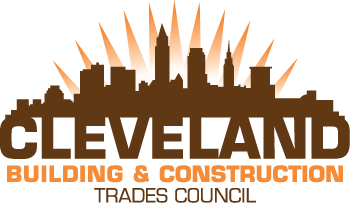Cleveland creates incentives to use Community Benefit Agreements
Cleveland leaders gathered on the steps of City Hall on June 27 to talk about the Community Benefits Ordinance recently passed by the City Council.
Ordinance 297-2023 was passed on June 5. It is designed to encourage developers to use Cleveland-based, minority-owned and women-owned businesses for construction projects in exchange for incentives. The new ordinance will also create job opportunities for members of the building trades and provide a pathway for more Cleveland residents to join the trades.
“I worked closely with the city on this, so I’m very pleased it passed,” said Dave Wondolowski, Executive Secretary and Business Manager of the Cleveland Building and Construction Trades Council.
During the event, Mayor Justin Bibb stressed the need to restructure the City’s Economic Development Department to be more responsive to the business community and be more aggressive retaining and attracting new companies. However, there also is a need to ensure women and minority contractors, along with residents, can benefit from the current construction boom.
He feels this legislation will help the city achieve all these goals.
Over the past four years, minority- and women-owned businesses lost out on nearly $14 million in wealth creation opportunities from Cleveland projects and development, according to the city.
Additionally, the ordinance claimed 358 full-time jobs were lost for Cleveland residents, which the city equated to $14.4 million in lost wages and $359,000 in lost payroll taxes.
Between 2014 and 2018, Cuyahoga County allocated $1.1 billion in prime contract spending, with only 4.62 percent ($51.5 million) awarded to minority- and/or women-owned businesses.
“A few non-union developers were getting away with using out-of-town contractors and paying far below area standard wages,” said Wondolowski, adding that passage of the ordinance was long overdue.
“This ordinance will set new standards for development in Cleveland,” he added. “It contains Project Labor Agreement language for large projects getting financial incentives from the city and requires the use of a local workforce.”
To receive the City’s financial assistance of $250,000 or more toward a project, a developer must agree to the following:
● Have a plan to meet Minority Business Enterprise (MBE), Female Business Enterprise (FBE) and Cleveland Area Small Business (CSB) participation goals.
● Present a plan to meet city resident and low-income resident employment goals.
● Participate in mentor programs for certified MBEs, FBEs, CSBs and residents.
● Provide registered apprenticeship and internship opportunities for Cleveland residents and provide Registered Apprenticeship Program, internship, and networking opportunities for Cleveland high school graduates and students.
● Agree to meet periodically with community stakeholders to gain input on the project.
If a project costs $20 million or more, the developer must take additional steps to receive the financial assistance, including the following:
● Enter into a Project Labor Agreement.
● Provide jobs for the previously incarcerated and at-risk youth.
● Offer a multitude of opportunities for MBEs, FBEs and CSBs.
● Host job fairs and networking sessions about upcoming contracting opportunities.
● Unbundle bid packages.
● Provide neighborhood and infrastructure safety improvements.
While the PLA language is key, Wondolowski believes the language related to Apprentice Readiness Programs and Registered Apprenticeship Programs will be a game-changer for members of the community.
